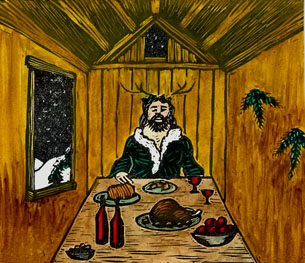|
 Winter
had come and the nights were long and dark and
cold. Snow fell softly over the fields and houses,
and between the clouds the stars shown like cold
and distant flecks of silver in the pitch black of
the sky. Winter
had come and the nights were long and dark and
cold. Snow fell softly over the fields and houses,
and between the clouds the stars shown like cold
and distant flecks of silver in the pitch black of
the sky.
King
Hollyhorn had grown heavy with the passing years,
and his beard was thick and there were threads of
white in his black hair. Each evening, a fire would
be lit in his great hall. Torches hung from the
walls, and there were many candles burning on the
tables. He would order his servants to bring out
bottles of wine, and roasts, and root vegetables
from the stores. Fresh loaves of bread were baked,
and apples brought up from the cellars. At
Hollyhorn's feasts, the people could forget, for
awhile, the dark winter outside their
doors.
Now at the
feast of midwinter, an aged seer appeared at
Hollyhorn's table. She ate and drank well, and when
she was done, she spoke in a hoarse whisper. All
those at the table fell silent to hear her
words.
"Before
winter ends, the stores will be emptied and the
food and wine will be gone. Many will die of cold
and hunger, and each person here will then regret
tonight's feasting with pain and
lamentation."
"Old woman,"
said Hollyhorn with a laugh. "As long as I am king,
no one will go hungry. There is more food in my
stores than any man can reckon. Let us celebrate!"
But some of his servants cast worried glances
amongst themselves.
The seer
nodded politely toward the king, and continued.
"Even your glorious reign will not last forever, my
lord. This very night a child is born who will take
the kingship from you. His eyes are as blue as a
summer sky, and his hair golden like the fire of
sunrise."
"Nonsense,"
said Hollyhorn. "I am at the summit of my power,
the height of my authority and
lordship!"
"Aye," said
the seer. "From the summit, all roads lead
downward."
Hollyhorn
laughed and had another bottle of wine opened and
passed around the table. But he also pulled one of
his servants aside and whispered in his ear. "Tell
the captain of my guard to search the city for a
house where a child is born tonight, and have that
child killed." The servant's face went white, but
he obeyed the king and went to the guard
captain.
The captain
went out and searched all the houses in the city.
At long last, he came to a small, disheveled house
along the city's eastern wall, and there he found a
newborn baby and his mother, lying in a cot close
to the fire. Both mother and child had fair skin
and hair the color of golden sunlight. He took the
child and told the mother of the king's orders. She
cried out and wept, but was too weak to stop the
strong young captain, who took the child from her
and went out into the winter night.
Whether
because of kindness or because of cowardice, the
captain could not bring himself to kill the baby
outright. Yet he also feared to disobey the king,
who could be terrible in anger. Therefore, he left
the city by the eastern gate, resolved to leave the
child alone in the forest, far from any dwelling,
where the cold, or the wolves, might take him. He
lit a lantern and plodded with heavy heart down the
path that led into the forest. Sometimes the snow
came up to his knees, but he traveled
on.
The trees
grew thicker around him as he walked, and the path
became hard to make out. Finally, in the densest
growth of the forest, he set the baby down on the
snow, wrapped in a blanket, and silently asked
forgiveness in his heart. Then he turned and made
his way back to the city. When he returned to the
king's hall, it was almost dawn. The king and
revelers were sleeping on the benches or on the
floor, with skins and furs around them for warmth.
The captain did not disturb them, but went to his
own home, where he slept restlessly.
Now it so
happened that an old woman passed by the spot in
the forest where the baby had been left, for she
could not sleep and wanted to be out among the
stars. She stooped down and lifted the child, who
was still alive. "Well, wonders never cease.
Blessed with a child, and at my age!" She held the
baby close to her chest, with her cloak and shawl
wrapped around him.
The old
woman took the baby to her cottage in the forest
and cared for him. She named him Goldhelm for his
bright yellow hair.
In the city,
Goldhelm's mother gazed out the window of her small
house as dawn came. She was still weeping, but now
she knew in her heart that somehow her child had
survived, and would live and grow to manhood, and
the knowledge lightened the burden of her grief. As
she gazed out beyond the city walls toward the
dense, snow-covered forest, the first light of
sunrise painted the sky in shades of green and gold
and white. Even now, she thought, in this darkest
night of winter, there is a spark of light, the
seed of a distant summer, yearning to sprout and
grow.
|